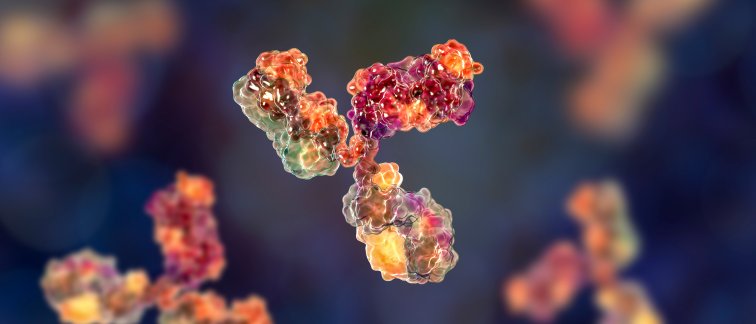A preprint by researchers from the Amsterdam Institute for Immunology and Infectious diseases, in collaboration with the University Medical Center Utrecht, Sanquin, and Vrije Universiteit Amsterdam, on bioRxiv has led to exceptional attention, with both Science and Nature featuring news articles about it on their websites. What findings have our researchers uncovered about Long COVID?
Scientists estimate that around 10–20% of people infected with the SARS-CoV-2 coronavirus will develop Long COVID, a severe condition characterized by symptoms such as intense fatigue, debilitating brain fog, and chronic pain that persist for at least three months after the initial infection. Affecting at least 65 million people worldwide, the causes of Long COVID remain poorly understood, and there are currently no proven treatments.
"Autoimmunity is frequently observed in Long COVID patients. But until now, the main unanswered question remained: is the relationship between autoantibodies and Long COVID causal?" says Jeroen den Dunnen, an infectious disease researcher at Amsterdam UMC. "In other words, do autoantibodies cause Long COVID symptoms, or are they simply generated in response to the infection?" Den Dunnen and his colleagues conducted the latest study to find an answer.
Research Methods and Findings
To explore this mechanism, den Dunnen and his colleagues collected IgG antibodies — the most common type found in human bodily fluids — from the blood of 34 people (analyzing plasma from 31 of them). The participants, who averaged 43 years old, developed Long COVID after mild SARS-CoV-2 infections during the first two years of the pandemic. Most experienced fatigue and chronic pain, requiring time off work.
The researchers divided the participants into groups based on the concentrations of various inflammatory proteins in their blood: those with markers of neuroinflammation, those with immune signaling proteins called interferons (often present after a viral illness), and a third group with neither of these signatures. They pooled the immunoglobulin G (IgG) antibodies from members of each group and injected each mouse with one of the pools.
Mice injected with IgG from the neuroinflammation and interferon subgroups showed heightened pain sensitivity, with the effect appearing especially quickly in the interferon group. Mice injected with IgG from the third group exhibited reduced walking distance a day after the injection, which researchers suggested could be related to high levels of muscle-related proteins in these patients’ blood. Mice injected with IgG from healthy control participants showed no changes in behavior.
Implications and Future Research
In summary, current research indicates that antibodies taken from individuals with Long COVID can heighten pain sensitivity and decrease movement in mice when administered to them. These findings suggest that antibodies could contribute to certain Long COVID symptoms, though the precise mechanism is still unclear and requires validation through larger studies.
In the coming period, Dr. den Dunnen and colleagues will continue this line of research with three main objectives: 1) further investigating the pathophysiology to determine which proteins, cells, or tissues are recognized by these autoantibodies and how this recognition causes symptoms; 2) utilizing the animal model for long COVID they have created to test potential therapies; and 3) developing an objective diagnostic test for long COVID by identifying specific autoantibodies, which would be the first of its kind.
For more information contact Jeroen den Dunnen (j.dendunnen@amsterdamumc.nl) or read the scientific preprint below.
Read the news article on the website of Nature here.
Read the news article on the website of Science here.
Amsterdam UMC researchers involved
Hung-Jen (Oliver) Chen1, Postdoctoral Scientist
Brent Appelman1, PhD Candidate Infectious Diseases
Amelie Bos1, Postdoctoral Researcher
Chiara E. Geyer1, PhD Candidate
Mads Larsen1,2, PhD Candidate
Eline Schüchner1, Master student Biomedical Sciences
Marije K. Bomers3, Internist-infectiologist
Ayesha H.A. Lavell3, Scientist Physician
Joost Wiersinga1, Professor of Medicine
Michèle van Vugt1, Professor of Internal Medicine
Jeroen den Dunnen1, Principal Investigator
1. Center for Experimental and Molecular Medicine, Amsterdam Institute for Infection and Immunity, Amsterdam University Medical Centers, location AMC, Amsterdam, Netherlands
2. Department of Experimental Immunohematology, Sanquin Research, Amsterdam, Netherlands
3. Department of Infectious Diseases, Amsterdam Institute for Infection and Immunity, Amsterdam University Medical Centers, location VUMC, Amsterdam, Netherlands
Funding
This project was supported by the Patient-Led Research Collaborative of Long COVID (grant ID: C1), Stichting Long-COVID consortium grant, the Netherlands Organization for Health Research and Development (ZonMw, grant number 10430142210001).
Learn more about our AI&I Long COVID research:
Nucleocapsid Protein Accumulates in Epithelium of a Post-COVID-19 Patient (November 2023)
Doctors advocate for large post-COVID study (March 2023)
Plenty of theories, but long covid remains a mystery (June 2022)

